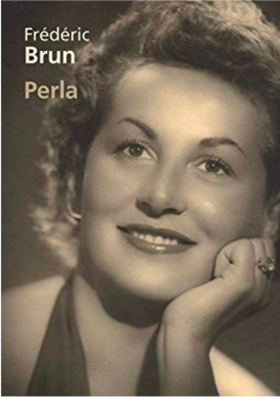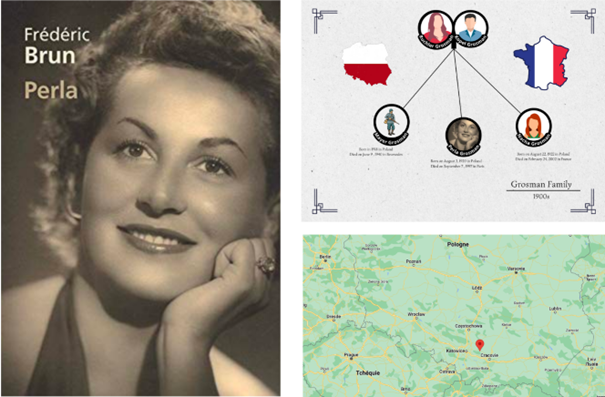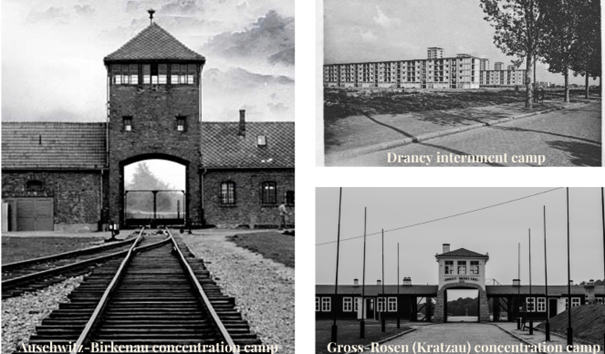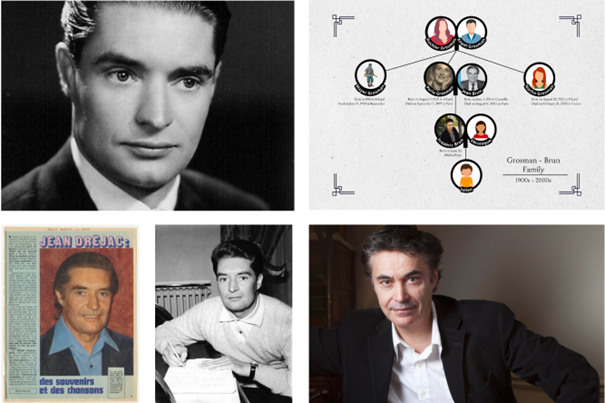Perla (Paulette) Grosman (1920-1997)
Perla’s childhood in Poland
Perla (who was known in France as Paulette) Grosman was born on August 3, 1920 in Olkusz (Kraków district, Lesser Poland) in Poland. Her parents were Kopel (Georges in French) Grosman and Ruchler (Renée in French) Brandwajnhendler. Both of them were born in Poland and were Polish citizens. Perla had an older brother Mayer, who was born in 1918, and a younger sister, Nacha, who was born in 1922.
Between the wars, the town of Olkusz was the administrative center of the county of the same name, which was then in the Kielce province. In 1931, the population of Olkusz was just over 9,900, almost half of which was Jewish. At that time, from an economic point of view, the town was flourishing.
Emigration to France
Perla Grosman, together with her family, left Poland for France in 1923. They set up home at 36 rue Château d’Eau in the Marais, a Jewish quarter of Paris. She later moved to 42 rue de Passy (now avenue du Président Kennedy). Until 1944, Perla worked as a dressmaker in Paris.
The war
When war broke out in 1939, Perla’s brother Mayer joined the army. He was killed on the front line at Beuvardes, in the Aisne department of France, on June 9, 1940.
The Gestapo arrested Perla at her home on the morning of Tuesday, July 4, 1944 (Operation Windsor, a Canadian attack during the Battle of Normandy, began that same day). She was apparently arrested on the grounds that she was carrying false ID papers, and the Gestapo then realised that she was a Jew.
Internment and deportation
Perla was taken to Drancy internment camp on July 7, 1944. When she arrived there, she was assigned the serial number 24091 and sent to a room on the fourth floor on staircase 19. Less than a month later, on July 31,1944, she was deported to the Auschwitz-Birkenau camp on Convoy 77.
She arrived in Auschwitz-Birkenau on August 3, 1944.
During the selection process, Perla was sent into the concentration camp to work. First of all, she had to get undressed and take a shower, and then she was then shaved and tattooed. From that moment on, the number on her arm, A16717, became her new identity. She was then forced to work in a factory. It appears that she never tried to escape from the camp.
In October 1944, she was transferred to the Kratzau camp, which was a sub-camp of the huge Gross-Rosen camp in the Sudetenland, a Nazi-occupied region of Czechoslovakia. It was near what is now the town of Chrastava in the Czech Republic. During her time there, she contracted typhus. She was freed on May 8, 1945, when the Red Army liberated the camp.
Perla was repatriated to France on June 1, 1945. She was taken to a reception center for returning deportees at the Lutetia Hotel in Paris, where she was issued with identity card number 0812.538.
Perla’s life after the war
Perla was officially granted the status of “political deportee” on June 4, 1956, and was issued political deportee card number 21.75.09.511. On July 30, 1948, the Paris police headquarters also issued her with a special resident’s card. This card, which could also be used as her identity card, was numbered 47AG19284 and was valid from July 30, 1948 to July 29, 1958. Perla was granted French citizenship by naturalization on August 12, 1949 in Paris.
Soon after the liberation, she moved to 49 quai de Passy in Paris. Later on, she lived with a Mrs. Chauvac at 50 Avenue de Wagram. She then moved again, this time to 33 Avenue Montaigne, in the 8th district of Paris. At that time, she was working as a sales representative. She also lived at 66 Rue Caumartin in Paris.
In 1956, she received a compensation payment of 13,200 francs.
Perla managed to rebuild her life despite all the trauma she had experienced during the Holocaust. After she got back to France, she set up a business. She then met a man called Jean André Jacques Brun, who was born in Grenoble, in the Isère department of France, in 1921. He also went by the name of Jean Dréjac, and was a famous French singer and composer, best known for the songs “Ah! Le petit vin blanc” and “Sous le ciel de Paris”. Perla and Jean got married in 1959 and went on to have a son, Frédéric Brun.
She also suffered from severe depression, however, and often became angry and withdrawn. She never spoke to her son about what had happened to her during the war.
Perla died on September 7, 1997 in the Kremlin-Bicêtre hospital in the Val-de-Marne department of France.
Her son, Frédéric Brun, began to search for more information about his mother when his wife was pregnant with their son, Julien. He wrote a book about his mother, entitled “Perla”, published in 2007, in which he describes the time he spent her before she died and recounts his quest to find out more about her life and her horrific ordeal in Auschwitz. When his father died in 2003, Frédéric decided to write a book about him too: entitled “Le Roman de Jean”, it was published in 2008.


 Français
Français Polski
Polski











